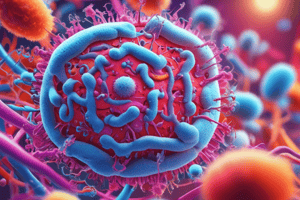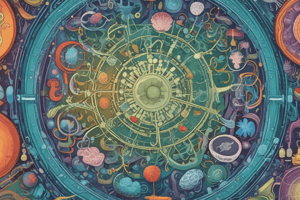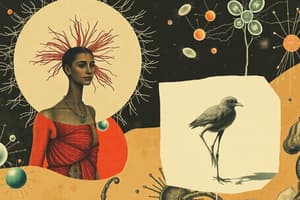Podcast
Questions and Answers
ما هي الطريقة التي تستخدمها البكتيريا لتنسخ نفسها؟
ما هي الطريقة التي تستخدمها البكتيريا لتنسخ نفسها؟
- التكاثر اللاجنسي (correct)
- التحول
- التكاثر الجنسي
- التنوع الوراثي
ما هي المادة التي توصف بأنها كربوهيدراتية غروية وتستخلص من الكائنات الحية الدقيقة؟
ما هي المادة التي توصف بأنها كربوهيدراتية غروية وتستخلص من الكائنات الحية الدقيقة؟
- الدهون
- البروتين
- الاجار (correct)
- السكريات
تكون أبواغ البكتيريا تستخدم للحماية في الظروف الملائمة.
تكون أبواغ البكتيريا تستخدم للحماية في الظروف الملائمة.
False (B)
توجد الميكروبات فقط في البيئات الرطبة.
توجد الميكروبات فقط في البيئات الرطبة.
ما هو الجدار الذي يحاط به البكتيريا عند تكوين الأبواغ؟
ما هو الجدار الذي يحاط به البكتيريا عند تكوين الأبواغ؟
اذكر نوع واحد من الميكروبات الموجود في الطبيعة.
اذكر نوع واحد من الميكروبات الموجود في الطبيعة.
تقوم البكتيريا بتكوين _____ للحماية في الظروف غير المالئمة.
تقوم البكتيريا بتكوين _____ للحماية في الظروف غير المالئمة.
طابق بين وظيفة البكتيريا وخصائصها:
طابق بين وظيفة البكتيريا وخصائصها:
تعتبر __________ كائنات حية دقيقة توجد في كل مكان في الطبيعة.
تعتبر __________ كائنات حية دقيقة توجد في كل مكان في الطبيعة.
قم بمطابقة أنواع الكائنات الدقيقة مع أوصافها:
قم بمطابقة أنواع الكائنات الدقيقة مع أوصافها:
ما هو مصدر الكائنات الدقيقة؟
ما هو مصدر الكائنات الدقيقة؟
ما هي أنواع الكائنات الحية الدقيقة؟
ما هي أنواع الكائنات الحية الدقيقة؟
هل توجد الفيروسات في كل مكان في الطبيعة؟
هل توجد الفيروسات في كل مكان في الطبيعة؟
هل يتم تكوين غلاف البروتين للفيروسات بواسطة الخلية العائل؟
هل يتم تكوين غلاف البروتين للفيروسات بواسطة الخلية العائل؟
هل يمكن للفيروسات التكاثر خارج الخلية العائل؟
هل يمكن للفيروسات التكاثر خارج الخلية العائل؟
هل تعتبر الفيروسات طفيليات بيو كيميائية؟
هل تعتبر الفيروسات طفيليات بيو كيميائية؟
هل يمكن القضاء على الفيروسات؟
هل يمكن القضاء على الفيروسات؟
ما هي خصائص الفيروسات?
ما هي خصائص الفيروسات?
ما هو شكل الفيروسات?
ما هو شكل الفيروسات?
هل يمكن للفيروسات نسخ نفسها داخل الخلية العائل؟
هل يمكن للفيروسات نسخ نفسها داخل الخلية العائل؟
هل تعتبر البكتيريا أكبر من الفيروسات؟
هل تعتبر البكتيريا أكبر من الفيروسات؟
هل تمتلك البكتيريا نواه حقيقية؟
هل تمتلك البكتيريا نواه حقيقية؟
هل تعتبر البكتيريا طفيليات؟
هل تعتبر البكتيريا طفيليات؟
هل تلجأ بعض أنواع البكتيريا الي التجرثم؟
هل تلجأ بعض أنواع البكتيريا الي التجرثم؟
هل تعتبر الفطريات كائنات دقيقة (حقيقية النواه)؟
هل تعتبر الفطريات كائنات دقيقة (حقيقية النواه)؟
هل يمكن رؤية بعض الفطريات بالعين المجردة؟
هل يمكن رؤية بعض الفطريات بالعين المجردة؟
هل جميع الفطريات وحيدة الخلية ؟
هل جميع الفطريات وحيدة الخلية ؟
ما هي طرق تكاثر الفطريات؟
ما هي طرق تكاثر الفطريات؟
هل تعتبر الكائنات المحللة كائنات رمية؟
هل تعتبر الكائنات المحللة كائنات رمية؟
هل تقوم الكائنات المحللة بهضم المواد الغذائية داخل خلاياها؟
هل تقوم الكائنات المحللة بهضم المواد الغذائية داخل خلاياها؟
هل تُعَد الكائنات المحللة حلقة وصل بين الكائنات الحية والبيئة غير الحية؟
هل تُعَد الكائنات المحللة حلقة وصل بين الكائنات الحية والبيئة غير الحية؟
هل تُعَد الكائنات المحللة ضرورية للحفاظ على الحياة على الأرض؟
هل تُعَد الكائنات المحللة ضرورية للحفاظ على الحياة على الأرض؟
ما هي أهميه معالجة مياه الصرف الصحي قبل صبه في البحر؟
ما هي أهميه معالجة مياه الصرف الصحي قبل صبه في البحر؟
ما هو تعريف التقانة الحيوية؟
ما هو تعريف التقانة الحيوية؟
ما هي أهمية التقانة الحيوية؟
ما هي أهمية التقانة الحيوية؟
ما هي مميزات أجهزة التخمير؟
ما هي مميزات أجهزة التخمير؟
هل ستكون عملية معالجة مياه الصرف الصحي أكثر كفاءة باستخدام جهاز التشغيل المستمر؟
هل ستكون عملية معالجة مياه الصرف الصحي أكثر كفاءة باستخدام جهاز التشغيل المستمر؟
هل تُعد البكتيريا والفطريات هي الكائنات الوحيدة التي تُستخدم في التقانة الحيوية؟
هل تُعد البكتيريا والفطريات هي الكائنات الوحيدة التي تُستخدم في التقانة الحيوية؟
Flashcards
الميكروبات
الميكروبات
أشكال صغيرة جدًا من الحياة، لا تُرى بالعين المجردة، وتوجد في كل مكان حولنا.
أنواع الكائنات الحية الدقيقة
أنواع الكائنات الحية الدقيقة
مجموعة واسعة من الكائنات الحية الدقيقة، تشمل البكتيريا والفطريات والفيروسات
الاجار
الاجار
مادة حيوية غروية، مصنوعة من الكربوهيدرات
نسائخ البكتيريا
نسائخ البكتيريا
Signup and view all the flashcards
التكاثر اللاجنسي
التكاثر اللاجنسي
Signup and view all the flashcards
أبواغ البكتيريا
أبواغ البكتيريا
Signup and view all the flashcards
جدار سميك
جدار سميك
Signup and view all the flashcards
التكيف للبقاء
التكيف للبقاء
Signup and view all the flashcards
العوامل الحية
العوامل الحية
Signup and view all the flashcards
البيئة الحيوية
البيئة الحيوية
Signup and view all the flashcards
العشيرة
العشيرة
Signup and view all the flashcards
كثافة السكان
كثافة السكان
Signup and view all the flashcards
المجتمع البيئي
المجتمع البيئي
Signup and view all the flashcards
المنظومة البيئية
المنظومة البيئية
Signup and view all the flashcards
الطاقة في المنظومة البيئية
الطاقة في المنظومة البيئية
Signup and view all the flashcards
المواد في المنظومة البيئية
المواد في المنظومة البيئية
Signup and view all the flashcards
البناء الضوئي
البناء الضوئي
Signup and view all the flashcards
التنفس الخلوي
التنفس الخلوي
Signup and view all the flashcards
Study Notes
General Biology - Year 3 - Science Section
- Subject: Biology
- Grade Level: Year 3, secondary school, science section
- Academic Year: 2022 - 2021
- Teacher: Nu'ima Kafo
- Unit 1: Microorganisms and their Applications in Biotechnology
Microorganisms and their Applications in Biotechnology
-
Source of Microorganisms:
- Two categories of scientists:
- Organisms created spontaneously
- Organisms originated from pre-existing living organisms.
- Spontaneous Generation:
- English scientist Needham (1745) supported the idea of spontaneous generation.
- Refutation of Spontaneous Generation:
- Louis Pasteur (1895-1822) disproved the theory. He demonstrated that microorganisms in Needham's flasks originated from contaminated air.
- Two categories of scientists:
-
Microorganism Definition: Tiny organisms invisible to the naked eye, commonly known as germs or microbes, found everywhere in nature.
-
Microorganism Types:
- Viruses
- Bacteria
- Fungi
Viruses
-
Definition:
-
Smallest organisms, located on the boundary between living and nonliving entities. They are complex chemical entities, nonliving outside the cell, but become a living entity when infecting a cell.
-
Obligate parasites, smallest disease-causing particles, only visible under high magnification electron microscopes, requiring significant magnification (e.g., ~250,000x).
-
Size: 10 to 300 nanometers (can be observed at around 30,000x magnification).
-
-
Structure:
- Protein coat: Protects the genetic material from digestive enzymes, defines shape and size, and determines host cell attachment.
- Genetic material (DNA or RNA): Used for viral replication inside host cells. Viruses use host cells' machinery.
-
Functions:
- Protein coat: Protects the nucleic acid from degradation by enzymes and determines structure/interactions with host cells.
-
Viruses and Cells: Viruses are not considered cells because they lack essential cell components like cytoplasm, nucleus, cellular organelles, and a cell membrane.
-
Viral Reproduction: Viruses rely on host cell ribosomes for the production of viral proteins.
-
Viral Shapes:
- Spherical (e.g., influenza virus, 0.1 µm diameter, RNA)
- Rod-shaped (e.g., tobacco mosaic virus, 0.3 µm, RNA)
- Complex (e.g., bacteriophages, 0.3 µm, DNA)
-
Viral Reproduction Mechanisms:
- Attachment: Virus attaches to a host cell (bacterial cell).
- Penetration: Virus injects its DNA/RNA into the host cell.
- Replication: The virus's nucleic acid commandeers the host cell's systems to create new viral components.
-
Assembly: Newly assembled viruses are released from the host cell, often causing cell lysis (bursting).
-
Viral Properties: Exhibit no biological activity outside a host cell (no feeding, breathing, excretion, growth, or reproduction). Intracellularly, viruses exploit host cell mechanisms.
Bacteria
-
Definition:
- Unicellular prokaryotic microorganisms larger than viruses, generally 0.01 mm long. Visible under a light microscope. Found in almost all terrestrial environments.
-
Structure:
- Cell wall: Rigid structure (protein, sugars, fats), maintains shape, protects cell contents, and facilitates cell division.
- Cell membrane: Controls substance passage. Site of respiration and energy production (lacking mitochondria in their structure).
- Capsule: Slimy coating protects from phagocytosis (white blood cells), facilitates adherence and disease.
- Cytoplasm: Contains single circular DNA (bacterial chromosome) and plasmids (small DNA rings carrying genetic information). Also stores glycogen and fats.
- Ribosomes: sites for protein synthesis.
- Flagella: Some bacteria possess flagella for movement. Most are non-motile.
-
Bacterial Classification by Shape: Cocci (spherical), bacilli (rod-shaped), spiral, vibrio.
-
Bacterial Classification by Nutrition: Saprophytes (decomposers), parasites (obtain nutrients from living organisms), autotrophs (produce their own food).
-
Bacterial Reproduction: Binary fission. Under unfavorable conditions, bacteria form dormant endospores, a resistant protective layer.
Fungi
-
Definition:
- Eukaryotic microorganisms; can be unicellular (like yeast) or multicellular (like molds, mushrooms). Some are visible to the naked eye; others require a microscope.
-
Structure:
- Some fungi are composed of spherical cells adapted for growth in liquid media (e.g., yeast).
- Yeast cells: Single, round, or oval, encased in a complex carbohydrate cell wall (chitin). Cytoplasm with stored nutrients (glycogen), a true nucleus (with a nuclear membrane), and a large vacuole.
-
Fungi Classification by Nutrition: Saprophytes (decomposers), parasites (obtain nutrients from living organisms).
-
Fungi Reproduction: Through spores. Some also reproduce asexually (like yeast via budding).
-
Methods of Digestion: Fungi digest food outside their cells, then absorb the digested materials. Secreted enzymes break down complex organic molecules in the environment.
Biotechnology
-
Definition: The large-scale, industrial use of biological processes (especially of microorganisms) to generate products and services. (Developed in the 1970s).
-
Applications: Food production, antibiotic production, single-cell protein (SCP) production, enzyme production, waste water treatment, and more.
-
Importance: Economical, cost-effective, and environmentally friendly.
-
Note: This is a detailed summary of Microbiology topics. Further details and examples are provided in the supplemental material.
Studying That Suits You
Use AI to generate personalized quizzes and flashcards to suit your learning preferences.




